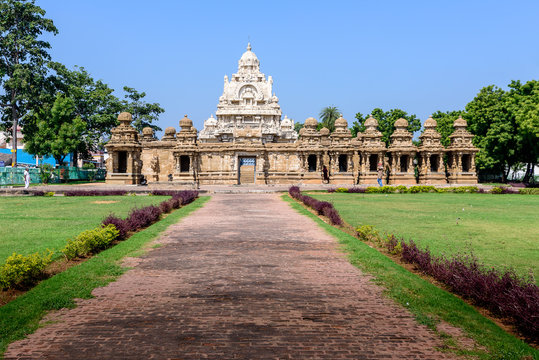¤ 11 minutes Read
Tiruchirappalli (Trichy)
A complete tourist and cultural guide
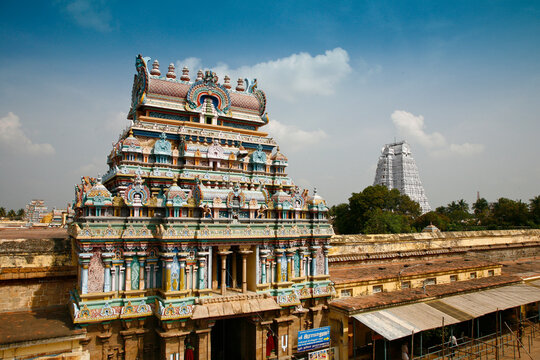
Tiruchirappalli, popularly known as Trichy, is a historic city in Tamil Nadu that blends spirituality, culture, and heritage. Famous for its towering Rockfort Temple and the grand Sri Ranganathaswamy Temple at Srirangam, the city is dotted with ancient monuments, vibrant markets, and serene riverbanks. With its mix of sacred sites and cultural charm, Trichy offers travelers a perfect glimpse into Tamil Nadu’s glorious past and lively traditions.
Wiki Link: Tiruchirappalli (Trichy)
Must-Visit Attractions in Tiruchirappalli (Trichy)

Rockfort Temple
Sits atop a 273-foot ancient rock, offering panoramic views of the city. The climb of over 400 steps leads you to shrines dedicated to Lord Ganesha and Lord Shiva, making it both a spiritual and scenic experience.

Sri Ranganathaswamy Temple
A sprawling temple complex dedicated to Lord Vishnu, is one of the largest functioning Hindu temples in the world. Its towering gopurams, intricate carvings, and vibrant rituals attract devotees.

Jambukeswarar Temple
Representing one of the five Panchabhoota Stalas, this temple is dedicated to Lord Shiva, symbolizing the element of water. With serene surroundings and remarkable Dravidian architecture.

Kallanai Dam
Built by the Chola King Karikalan around the 2nd century CE, one of the oldest functioning dams. It beautifully showcases Chola engineering and continues to irrigate vast farmlands.
Major Attractions Nearby Tiruchirappalli (Trichy)
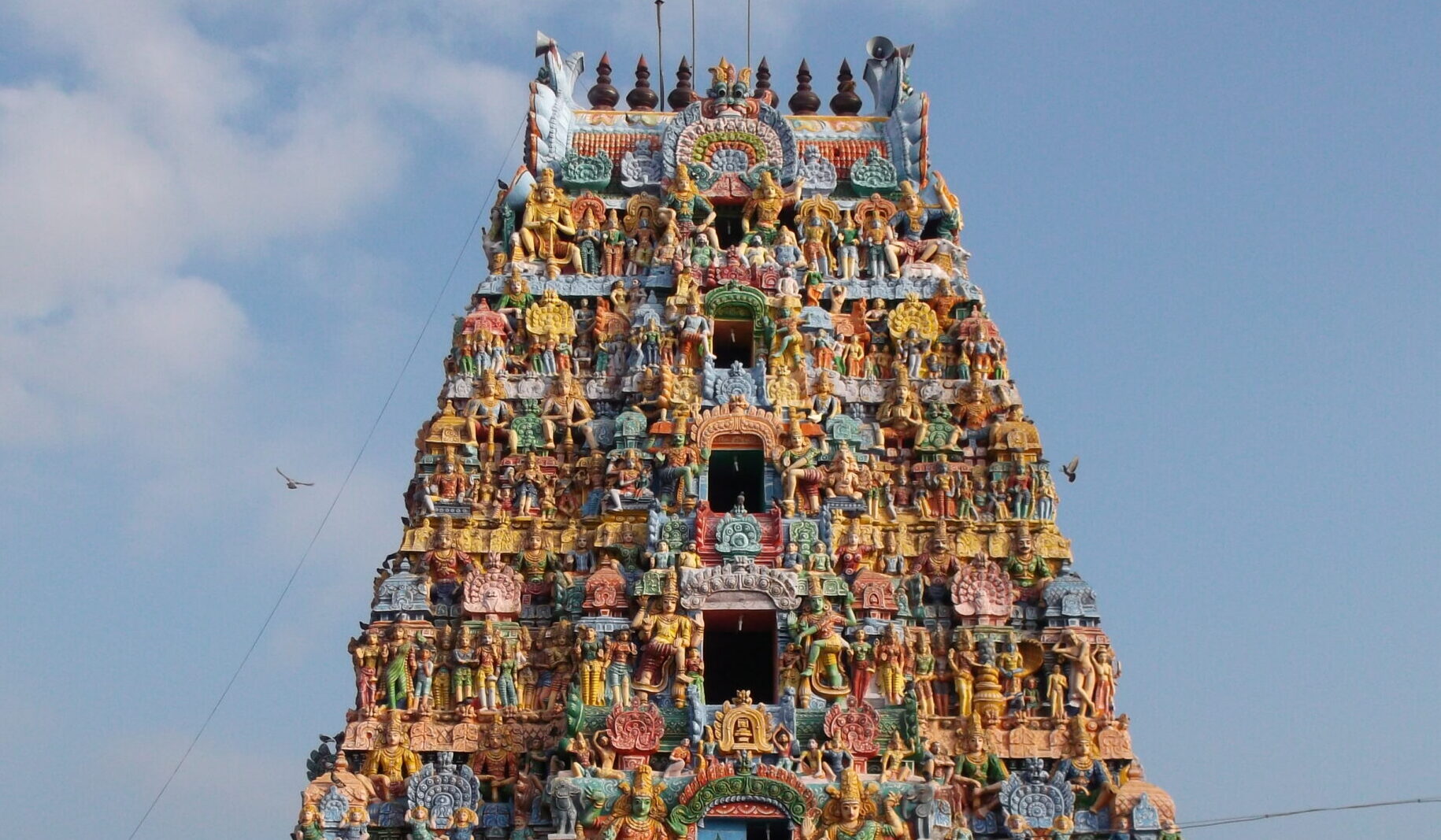
Thanjavur
Just 60 km from Trichy, is home to the UNESCO-listed, an architectural masterpiece of the Chola dynasty. Its grand vimana and detailed frescoes reflect the glory of Tamil temple architecture.
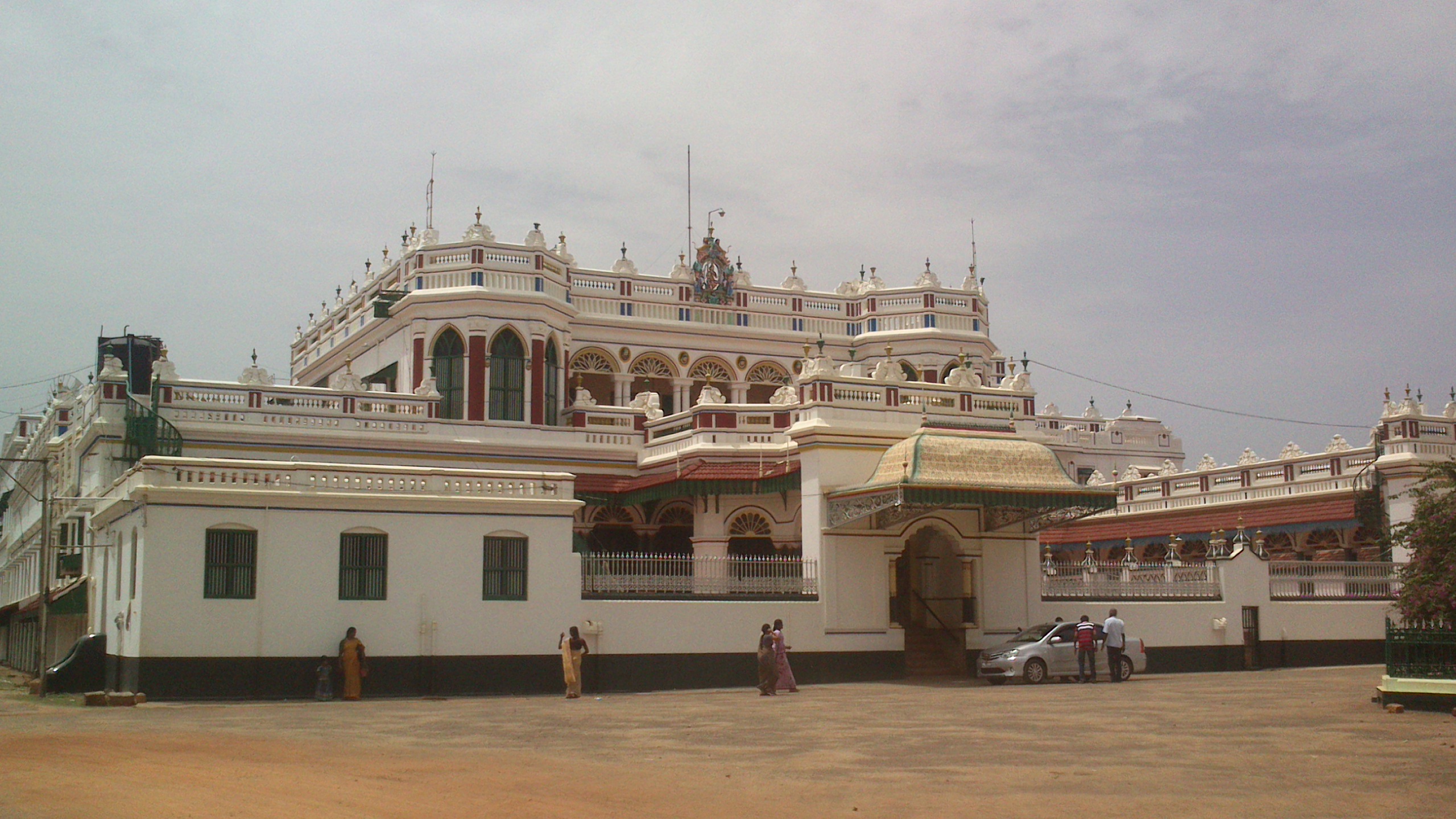
Chettinad
Around 90 km from Trichy, Karaikudi in Chettinad is famous for its palatial mansions, Athangudi tiles, and spicy Chettinad cuisine. It’s a cultural delight for history buffs and food lovers.

Puliancholai Hills
Located about 70 km from Trichy, Puliancholai is a serene hill spot at the base of Kolli Hills. With waterfalls, streams, and lush forests, it’s perfect for a refreshing nature escape.

Mukkombu
About 18 km from Trichy, Mukkombu is a popular picnic spot where the Kaveri River branches into two. The calm waters, greenery, and pleasant atmosphere make it ideal for family outings.
Things to do in Tiruchirappalli (Trichy)
From exploring ancient architecture to enjoying local cuisine and scenic riverbanks, visitors can experience the vibrant essence of Tamil Nadu.

Climb Rockfort Temple
Ascend over 400 steps to reach the Rockfort Temple for panoramic city views. The climb combines adventure with spiritual exploration.

Sri Ranganathaswamy Temple
Wander through the sprawling corridors of the temple, admire intricate carvings, and witness vibrant rituals.

Take a Riverfront Walk at Mukkombu
Enjoy a peaceful stroll along the Kaveri River. The scenic beauty, flowing waters, and lush surroundings make it ideal for photography and relaxation.
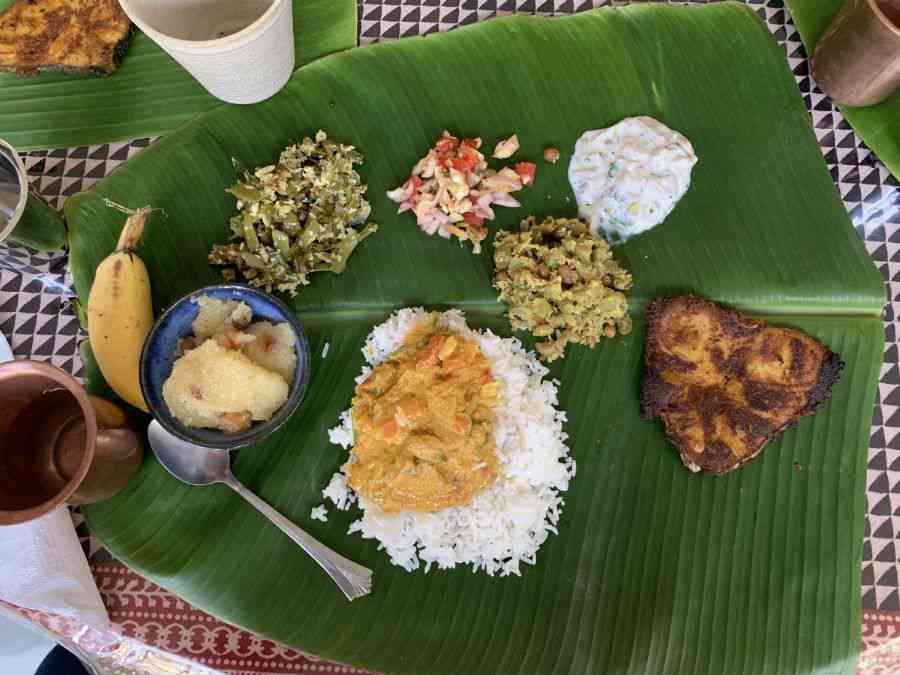
Sample Local Cuisine
Taste authentic Tamil dishes like idli, dosa, sambar, and Chettinad specialties. Sampling local cuisine is a must-do to experience the flavors of Trichy.
The Performing Art of Tiruchirappalli (Trichy)
A vibrant hub of South Indian classical arts, reflecting centuries of cultural heritage. The city has a strong tradition in Carnatic music, with many local musicians performing devotional and classical compositions. Bharatanatyam is the prominent dance form here, often performed during temple festivals and cultural gatherings, showcasing storytelling through intricate gestures and expressions. Traditional percussion instruments like mridangam and kanjira are integral to musical performances, adding rhythm and depth. Trichy also hosts occasional folk performances and religious dramas, keeping the local performing arts alive.
Gaana
Carnatic Music
Folk Music
A notable center for Carnatic classical music, with temples and cultural institutions promoting performances of compositions by Tyagaraja, Muthuswami Dikshitar, and other legends. Devotional songs and temple hymns form an integral part of the city’s musical heritage. Traditional percussion instruments like the mridangam and kanjira accompany vocal performances, enhancing the rhythmic experience.
Bharatanatyam
Kolattam
Karakattam
Renowned for Bharatanatyam, the classical dance form that originated in Tamil Nadu and flourished under temple patronage. Characterized by precise footwork, expressive gestures, and storytelling, Bharatanatyam is regularly performed during temple festivals and cultural events. Folk dances and devotional performances also enrich the local cultural scene, reflecting regional traditions and community celebrations.

City Vibes - Timeless Spiritual Charm
Exudes a vibrant blend of history, culture, and spirituality. The city streets are dotted with ancient temples, bustling markets, and colonial-era architecture, reflecting its rich past. Festivals bring the city to life with music, dance, and rituals, while local eateries offer authentic Tamil cuisine that tempts every visitor.
The flowing Kaveri River adds a serene charm, providing scenic spots for relaxation and photography. Trichy’s unique combination of heritage, devotion, and lively urban energy creates an unforgettable experience for travelers.
Heritage of Tiruchirappalli (Trichy)
With its history spanning the Chola, Nayak, and Vijayanagara periods, is a treasure trove of South Indian heritage. The city is home to iconic temples like Sri Ranganathaswamy Temple and Jambukeswarar Temple, showcasing Dravidian architecture and intricate carvings. Ancient forts, such as the Rockfort, tell tales of battles and royal strategy. The city also preserves centuries-old cultural practices, including classical music, Bharatanatyam dance, and traditional crafts.

Cuisine of Tiruchirappalli (Trichy)
Offers a rich culinary experience with authentic Tamil flavors, traditional meals, and street food delights

Idli & Sambar
A staple breakfast dish, idli with sambar and coconut chutney is light, nutritious, and flavorful.

Pongal
A comforting rice and lentil dish, Pongal is often served during festivals or temple visits
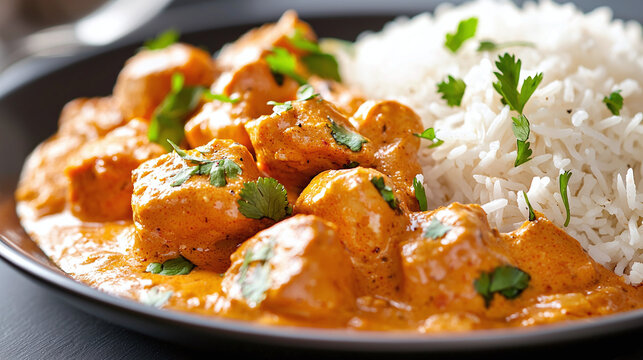
Chettinad Chicken Curry
A culinary delight. Prepared with freshly ground masalas, it represents the bold taste of Tamil Nadu’s cuisine.

Halwa
A traditional sweet, often offered as prasadam in temples, halwa is soft, fragrant, and mildly sweet
Shopping in Tiruchirappalli (Trichy)
A vibrant shopping destination for traditional crafts, textiles, and souvenirs that reflect the city’s rich culture and heritage.

Brass Artifacts
Famous for its brass and bronze statues. These handcrafted items make excellent souvenirs and showcase the region’s rich metallurgical tradition.
Handloom Sarees
The city offers a variety of handloom silk sarees, reflecting traditional Tamil designs. These sarees are prized for their vibrant colors, intricate patterns.

Temple Jewelry
Inspired by temple motifs, this jewelry features intricate designs often used in classical dance performances. It is a perfect pick for cultural enthusiasts and gift buyers.

Local Snacks and Sweets
Offer a variety of traditional snacks and sweets, like murukku and halwa. These edible souvenirs capture the authentic taste of the region.
Tourist's Handbook
The best time to visit Trichy is during the winter months, from November to February, when the weather is cool and pleasant. This season is ideal for sightseeing, exploring temples, and enjoying outdoor activities without the discomfort of heat or humidity. Festivals like Pongal and local temple celebrations add cultural charm to the visit. Avoid the peak summer months (April to June) due to high temperatures and the monsoon season (July to September) for heavy rains.
Stay Aware Around Temples – Temple complexes can be crowded and slippery; wear comfortable footwear and be cautious while climbing steps.
Beware of Overpriced Guides – Hire guides only through hotels or official tourism offices to avoid scams.
Avoid Late-Night Solo Walks – Stick to well-lit and busy areas after dark, especially if unfamiliar with the city.
Respect Local Customs – Dress modestly when visiting temples, remove shoes, and seek permission before taking photos of devotees or priests.
Drink Bottled Water – Prefer sealed bottled water to avoid stomach issues, particularly during hotter months.
Navigating Trichy is convenient with a mix of local transport options. Auto-rickshaws and tuk-tuks are ideal for short distances within the city, while taxis and app-based cab services like Ola or Uber are suitable for longer trips. Walking is recommended in areas like Srirangam and the Rockfort vicinity to fully experience the temples and local streets. For exploring nearby attractions, hiring a cab or using private vehicles is the most comfortable option. Bicycle rentals are also available for a leisurely tour of scenic spots along the Kaveri River.
Overpriced Auto-Rickshaws – Always agree on the fare before starting your ride or insist on the meter.
Fake Guides – Hire guides recommended by hotels or official tourism offices to avoid misinformation and overcharging.
Temple Donation Scams – Confirm any ritual or offering charges before participating in temple ceremonies.
Souvenir Shop Pressure Sales – Compare prices before buying handicrafts, brass idols, or textiles from local markets.
Entry Fee Misrepresentation – Most temples are free or have nominal charges; avoid paying “extra fees” to touts or unverified guides.
Tiruchirappalli (Trichy) Blogs
- Tamil Nadu Cultural guide
- Places to visit in Tiruchirappalli (Trichy)
- Places to visit nearby Tiruchirappalli (Trichy)
- India’s most popular destination
- India’s archaeological marvels
Recommended articles
- Uttar Pradesh Cultural guide
- Places to visit in Varanasi
- Places to visit nearby Varanasi
- India’s most popular destination

